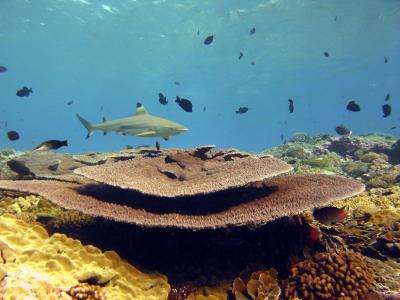The Line Islands Collection: Microbial dynamics of coral reef robustness and decline

Coral reefs face serious threats primarily arising from climate change, unsustainable fishing, and pollution. To better understand the underlying processes, a multidisciplinary series of studies is being conducted by researchers, investigating variability in coral reef community structure and microbial dynamics across gradients of natural and anthropogenic stress. Their results are published in the new PeerJ "Line Islands Collection – Microbial dynamics of coral reef robustness and decline" (named after their upcoming expedition to the Line Islands).
As part of an effort to better understand the effects of anthropogenic influences on these fascinating ecosystems, and specifically how microbial communities affect coral reef robustness and decline, a new expedition to the Line Islands (located in the central Pacific Ocean and one of the most pristine coral reef systems remaining on the planet) will be launched in the fall of 2013. In the run-up to this expedition, a Collection of related articles is being launched in the open access journal PeerJ and as the work of this research collaboration builds up, the Collection will continually expand to include all relevant publications.
The main focus of the Line Islands expedition will be to shed light on the intricate interactions between microbes, coral, algae, and fish and so the researchers leading this body of work have expertise spanning many different scientific disciplines:
The Laboratory of Forest Rohwer, of San Diego State University, investigates the interactions between microbes and macroorganisms in coral reefs, specifically how these systems respond to perturbation. Jennifer E. Smith and her team from Scripps will investigate how local (fishing, pollution, species invasions) and global human impacts (warming, acidification) affect competitive dynamics among benthic taxa and alter community structure. Finally, the group of Stuart Sandin at the Scripps Institute of Oceanography has interests that are centered on predator/prey dynamics and how those dynamics shape the coral reef community. Collectively, these groups have investigated, and will further study, the biogeochemical processes which shape coral reef ecosystems, spanning spatial scales from microns to thousands of kilometers.
By presenting their articles as a cohesive Collection, the researchers hope to demonstrate some of the implications that result from considering coral reef microbiology on a new scale – something which may help others to see these findings in their broader context.
The "Line Islands Collection" is launched on July 16th with four related articles. New articles will be added to the Collection as and when they are published in PeerJ.
Journal information: PeerJ
Provided by PeerJ


















